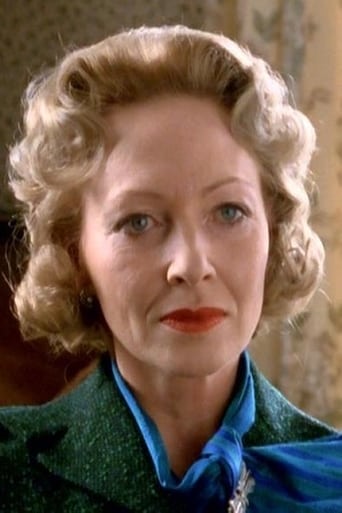Wordiezett
So much average
SnoReptilePlenty
Memorable, crazy movie
InformationRap
This is one of the few movies I've ever seen where the whole audience broke into spontaneous, loud applause a third of the way in.
Roxie
The thing I enjoyed most about the film is the fact that it doesn't shy away from being a super-sized-cliche;
tedg
Fellini is a visionary mystic. He sees what he knows before he figures it out. So we have set design, costume design, even character design, before he fills things in with his narratives and allegories. I know this, so don't come to be disappointed when the stories and allegories do not quite work. It is the sign of risktaking that he allows his vision to outrace his sense.Shakespeare thought "The Tempest" would be his last play. The technology of the stage had left him behind, so in a sort of final flourish built a play that exploited the new special effects, costume and stage technologies, far better than his contemporaries. And within that he placed a surrogate of himself. The play is full of deep observations on the nature of life and reason. Each of these is essential to his purpose, which was to present himself through ideas. Few of these were necessary to advance the story. Much was made of the plays within the play and who controls what elements of themFellini similarly believed this to be his final film. At 62, already advised that his heart would give out, he poured everything he wanted to say into this. Yes, he always did that, but this time he used "The Tempest" as his guide. Afterwards he would go to Peru for inspiration.The film is folded into a literal opera, an opera about the life of a famous opera star, which morphs from small stories (a singoff in the boiler room) into an opera of war.Orthogonally, the film is folded twice into an inner film being made of the event and an outer film of the film. The way we are introduced to these two devices simultaneously is one of the most trilling beginnings in the history of cinema. There is an inner, inner séance. As a film experience, it is much like "Duck Soup," where the fakery and frippery is exposed and unremarked on: in the thing itself; in the ridiculous pomp of "royalty;" in the strutting of the artists, all conflated.I would have been tempted to give this the honor of being one of the two Fellini films I set as fours. That would be because when a man prepares to die, it matters what he says. But it so happens that he thought the same before the two I picked.Ted's Evaluation -- 3 of 3: Worth watching.
Graham Greene
In keeping with the style and tone of his later-period films, like Fellini-Roma, Amarcord and Casanova, ...And The Ship Sails On is a purposely elaborate and overly-stylised romp through the decadent and the grotesque, as a congregation of mourning opera singers find themselves stuck on a drifting ocean liner, whilst, unbeknownst to them, the first World War is breaking out across Europe. Like all of Fellini's work following 8 ½ (or maybe even going as far back as Nights of Cabiria), the films seems loose and directionless, propelled along by a series of darkly-comic set-pieces, colourful characters and grand cinematic gestures. It's less sprawling than a film like La Dolce Vita and less abstract and thematically repulsive as Satyricon, with the film falling somewhere in between, probably ending up closer to the fantastical stylisation and nostalgic fabrication of Amarcord than anything else.It's certainly more focused than many of his films from the same era, with Fellini managing to present a loose story that we can actually buy into, whilst the use of humour here is much broader and more central than some of his other films, with the references to Chaplin and the silent age helping to undercut the overt-stylisation (a thousand acres of plastic seas, a huge light bulb sun, etc) and the lack of an obvious central character (or any real character, for that matter). Once again, Fellini deals in caricatures, choosing actors more for their physical appearance than any kind of acting ability, then directs them to mug to the camera with movements and expressions as grand as the film's design.The photography here is exquisite (like all Fellini), with the director creating a number of beautiful images and compositions that look like paintings from the early part of the last century. The opening scene for example is the most astounding thing that the director ever created... the crew and opera singers carry the coffin of their beloved soprano down the jetty and up onto the ship in a series of long, sweeping crane shots. Deceptively, but also as to illustrate his cinematic references, Fellini begins the film with no sound and in a dull, brown sepia. As the film progresses, and the camera follows the mourners and the actions of the ship's crew, the sound of the ship-yard begins to slowly fade in... much like the colour of the images. There are a number of other stand out cinematic moments, in which Fellini gracefully orchestrates the actors and his camera so that their movements are integrated, almost like a musical, whilst the use of fast-motion to over-exaggerate the period feel and to create a sense of farce that works well with the material, and Fellini's style of direction.Some might argue that the film is quite trivial and never really ascends to the level of greatness set by the likes of La Strada, 8 ½ and Amarcord, and I suppose that's true, but for me, the film creates such an atmosphere and such a wholly intoxicating world of stylisation, arcane historical references and the trademark Fellini absurdities, that the whole film becomes a joy to sit through. On top of all the grand visual flourishes, outlandish characterisations and general Fellini-isms, there's also the various symbolic references and narrative interpretations, which give the film a further layer of entertainment.The use of World War One as a pivot for the latter half of the story is an essential one and is important in as much as it allows Fellini (after so much time spent on spectacle and cinematic buffoonery) to create a notion much more meaningful and memorable. There are a number of interpretations and connotations you could connect to the idea of the ship (a metaphor about class... society... royalty... the birth of a nation... the idea of escape... the ship of fools... etc) and the idea of life and death, so irremovably woven into the depiction of the mourners. So, what begins as a typically Fellini-esquire romp, gradually becomes something much more meaningful, and remains, in my opinion, his last true masterpiece.Admittedly, it's nowhere near as essential as his earlier films, pre-8 ½, in which his work generally had a much greater degree of narrative and cohesion, though from his later, more grandiose films, ...And The Ship Sails on remains an absolute treat... better than the difficult Roma and Satyricon, more impressive and enjoyable than Casanova and The City of Women and perhaps just short of the charm and atmosphere of the masterpiece Amarcord. All in all, an epic and enjoyable film that stands as a grand testament to one of the artistic giants of post-war cinema, 20th century cinema.
Giulietta_degli_spiriti
That's totally true, Adam. Fellini says in few minutes what directors and writers wanted (do they really want?...) to say in many ignorant movies, like Spielberg's or Cameron's movies. Pay attention that "ignorant" is not an injury, it's simply an adjective for those kind of movies that just don't promote the intellect. But, hey, we are talking about show business, not "art business" or "show art", but "show" and "business". But I really think it's a waste of time to do a movie just for people laugh or cry and do it mentally ill. So then it's not correct to call people like Spielberg and CIA. as "artists", because they have the same job as the magicians in children parties. Fellini is an artist, he makes real art, not just for making businesses or a great stupid show to people be delighted with the illusion of the happy endings.
Aw-komon
Fellini's worst film? What nonsense! If you want that "Satyricon" is waiting for you. Antonioni has called this one of his favorite Fellini films and after seeing it myself, I knew he didn't make that judgment rashly. "And the Ship Sails On" is a thoroughly 'modern' film and one of the maestro's best--certainly as good as "Amarcord," and probably better. It is less crudely silly and linear than "Amarcord" and harder to understand for anyone not intersted in progressive cinema, much more ambiguous, flexible and prone to take risks. To even breath the climate of opinion which deigns to compare this ambitious masterwork to an overblown piece of commercial fluff like 'Titanic' is nauseating. The fact that both films happen to take place on the deck of a ship is their only similarity and the 'message' of Titanic has absolutely nothing do with what Fellini was trying to say. Fellini doesn't make 'allegories' of society; at his best, he makes 'allegories' of 'allegories.' His sense of humor goes deep enough to include ridicule of people who take allegories too seriously within his allegories, hence his true artistry. And those kinds of people, obviously, sense that the joke is on them, and don't particulary like this film. The level on which Fellini succeeds is invisible to them, outside their conditioning. And often they claim to be bored just to cop-out on having to examine themselves and their ingrained ways of thought and judgment too closely. In fact, you could write a whole book analyzing "And the Ship Sails On" solely on its deep artistic value and another on all the great things in this film that certain 'cultured' people don't get because of their particular brand of 'high-brow' conditioning. "And the Ship Sails On" is a PURE film, folks, one of the few amidst an ocean of endless mediocrity; and that is the hardest thing to achieve when trying to integrate as many elements as Fellini tries for (he himself has failed many times precisely because he was seeking purity within excess and got lost). He tried for it all and got the balance right this time. It is both satirical and deeply serious, excessive and understated. It is a totally stylized non-sentimental 'sentimental' work in the best sense. It works on many levels and transcends petty criticism from anyone too busy making mountains out of the latest flashy molehill that caters directly to their tastes. This film isn't traditional cinema, it is progressive all right, but it will be ready for you as soon as you're ready for it. Watch it for yourself with an open mind (whenever you're ready for it) and experience the power of art: it's worth more than you've been taught to think it is.





